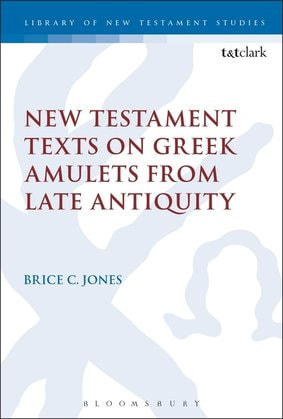|
My article on a recently identified papyrus has finally been published in the latest issue of the Journal of Biblical Literature (JBL). The small scrap of papyrus, housed in the University of Michigan Papyrology Collection, contains a partial citation of Matthew 1:20 in Greek. I argue that the papyrus may have served as an amulet, as this passage from the gospel of Matthew is ritually charged (it involves the utterance of an angel), is written on one side, and appears to have been folded. I have tentatively dated the papyrus to the sixth-seventh century C.E. Despite its fairly late date, it is the only amulet to preserve this portion of gospel text and stands among the earliest textual evidence for this particular verse.
Since my book on Greek New Testament amulets was published in 2016, two other amulets have been published, excluding this one: Thomas Wayment published a Greek papyrus amulet containing a citation from Colossians, and Lincoln Blummel published one with a citation from Acts. I recommend that all three of these should be added to the list of amulets that started with Ernst von Dobschütz in 1923, a category that I have argued should be reinstated in the official list of New Testament manuscript, overseen by the Institut for Neutestamentliche Textforschung. I have uploaded the article to the publications section of this website here. UPDATE: This fragment has been assigned a number in the Trismegistos/LDAB portal as 754090 and can now be cited accordingly.
3 Comments
Research Webinar on Greek Papyri in the British Library Rodney Ast (Heidelberg University) and Lajos Berkes (Humboldt University - Berlin), in partnership with Peter Toth at the British Library, are offering in Summer Semester 2018 an online seminar on Greek papyri housed in the BL. The aim of the class is to study and describe Greek documents and literature preserved on papyrus. Each participant will be assigned a group of papyri and the resulting descriptions will contribute to the BL’s freely accessible online catalogue. The texts will include published and unpublished documents (mainly letters and receipts), as well as a small number of published literary texts. The course, which is free of charge, is open to participants of all levels and will be conducted online Tuesdays, 16:15 - 17:45, Central European Time. The first meeting is scheduled for April 17th and the last for July 10th. The language of instruction is English, and good knowledge of Ancient Greek is required. Certificates will be issued upon successful completion of the class. Those interested in taking part should send a brief statement of interest and CV to Rodney Ast at [email protected]. The deadline for applications is March 30, 2018. The course is sponsored by the Ministry for Science, Research and Art in Baden-Württemberg, Germany, as part of Heidelberg University’s "Webinars in Specialized Disciplines" initiative. From Pagan to Christian: Papyrology, Epigraphy, and the Divine – Colloquium
Baylor University, March 16 and 17 Friday, March 16th: Cox Lecture Hall, lower floor of Armstrong Browning Library.
|
Archives
December 2020
Categories
All
|

